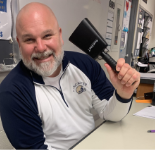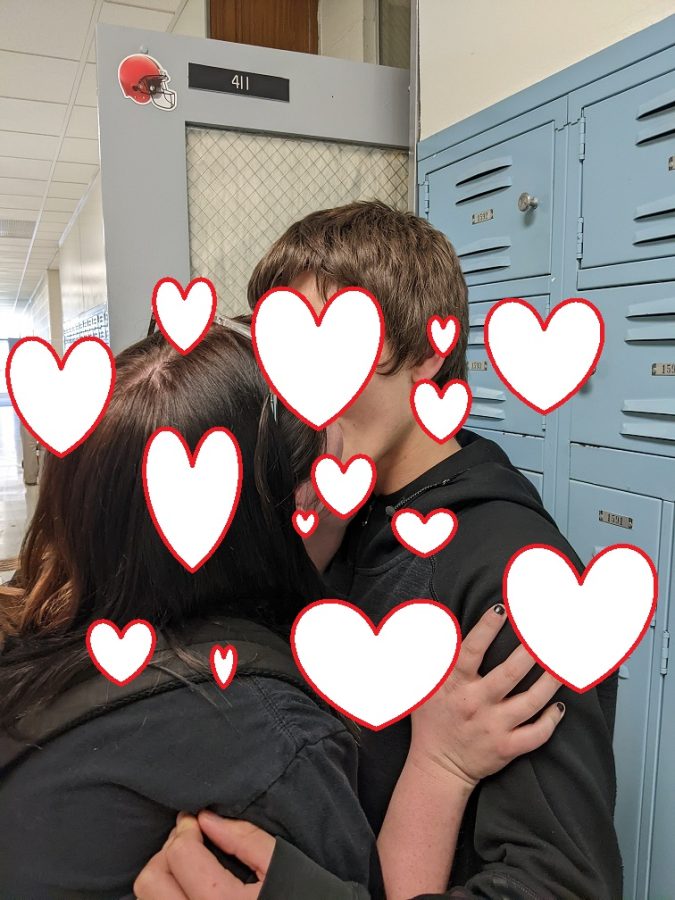Lovers Lane at LHS
The ABCs of PDA – proper displays of affection
April 17, 2023
Everyone has seen it. Couples who cuddle and kiss in the nooks and crannies of the hallways at Lancaster High School. Public displays of affection among couples at the school range from an innocent peck on the cheek to an outright make-out session. Rules prohibiting PDA are clear in the LHS Handbook which states that “students shall not engage in inappropriate sexual behavior while under the jurisdiction of the school or representing the school.”
Eye of the Gale interviewed some students and staff members such as science teacher Mont Goss to get their take on the ABCs of PDA at LHS.

“What we see in the hallways is beyond social appropriateness for the moment and place. This is a public school; wouldn’t be any different if it was a public park,” he said.
LHS Custodian Grandma ( Darla Zartman) said she sees a wide range of affection between couples in and around the GAC area of the school.
“I see kissing, I see hugging, and I see people doing stuff that they should not be doing,” she said.

LHS sophomore Mae Barnecut said that so much of the PDA she sees at school makes her feel awkward.
“I am a bit uncomfortable with some PDA because it just doesn’t feel respectful in a way like I understand touching your partner for comfort or even to show affection but kissing and worse is a bit excessive,” she said.
LHS freshman, Cole Atkins, spoke about his thoughts on excessive PD.
“Some people go overboard with the kissing and the hugging, so I kinda feel weird,” he said.

Goss said he tries to discourage public displays of affection in public areas at school by ringing a loud cowbell at the students who are showing inappropriate behaviors.
“When I see PDA in the hallway that’s a little too excessive they get belled. I’m ringing the bell, it usually stuns them. Then we talk about what’s appropriate,” he said.
“We need to make it a place where everyone is comfortable, if you’re standing up here in the stairwell and you’re all over each other, well that’s uncomfortable for many people, so I bell them up,” said Goss.
According to the article, Addressing Public Display of Affection at School, published by ThoughtCo, an award-winning educational source, public displays of affection should be kept out of the public eye.
“Being overly affectionate at school can be offensive and is generally in poor taste. The expression of feelings toward one another is a personal concern between the two individuals and thus should not be shared with others in the general vicinity” (Meador).
There are appropriate ways to share the love. A hug. A peck on the cheek. Holding hands.
“Examples of non-excessive PDA would be, no excessive kissing (preferably none) or excessive hugging. Light interaction is an okay form of PDA. I consider light interactions to be nothing serious or weird,” said LHS freshman Ethan Combs.

“Positive PDA could be a brief hug, holding hands, arm over the shoulder, holding onto one’s arm or locking arms, leaning one’s head on the other’s shoulder. I would describe appropriate PDA as anything that won’t make other people uncomfortable, like kissing,” Combs said.
Mae Barnecut, who’s been in a relationship for more than a year, explained how she and her boyfriend express their affection while at school.
“I personally do not show excessive PDA at school because it makes me uncomfortable and a bit anxious, but we do show some PDA for example we will hold hands on occasion but usually it’s just the walking close to each other and the occasional touch,” said Barnecut.
Medical News Today reports that humans are largely social beings, and some research suggests that many people feel comfort, security, and satisfaction from physical contact. However, boundaries are necessary to define what are safe, acceptable, and reasonable examples of behavior in public places. Goss said that he thinks teens can have positive relationships without excessive PDA.
“I think relationships are healthy as long as it’s healthy for both people. There are mistakes to be made in a relationship. We’re human. But some of these can end in a really bad breakup. It’s just part of the teen experience. We have to learn to rebound from those things and realize they’re not meant to be and teach a lesson,” said Goss.


